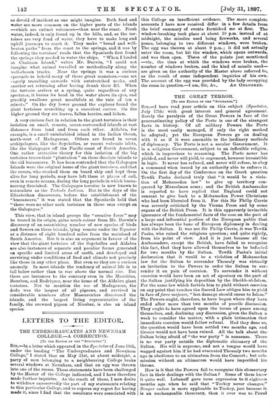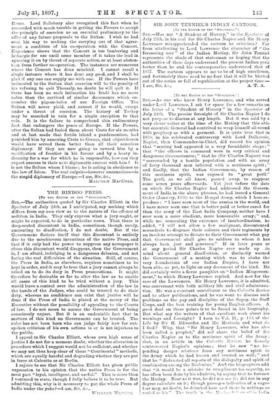THE GREAT TERROR.
[To THE EDITOR OF THZ EPICS/TOR:] SIE,—I have read your article on this subject (Spectator, July 17th) with great interest and general agreement. Surely the paralysis of the Great Powers in face of the procrastinating policy of the Porte is one of the strangest facts in history. Of all military Powers the Porte is the most easily managed, if only the right method be adopted ; yet the European Powers go on dealing with it as if it were amenable to the 'ordinary methods of diplomacy. The Porte is not a secular Government. It is a religious Government, subject to an inflexible religion,. which is impervious to reasoning. The Porte never has yielded, and never will yield, to argument, however irresistible in logic. It never has refused, and never will refuse, to obey a command when issued by an authority able to enforce it. On the first day of the Conference on the Greek question Tewfik Pasha declared truly that "it would be a viola- tion of Mohamedan law" to give up territory con- quered by Mussulman arms ; and the British Ambassador- is reported to have replied that England could not consent to give back to a Mohamedan Power Christians who had been liberated from it. For this Sir Philip Currie was severely criticised by the Vienna Press and by some organs of the British Press. It is this apparently invincible ignorance of the fundamental facts of the case on the part of a large and influential portion of the European public that has always been the bane of European diplomacy in dealing with the Sultan. It was not Sir Philip Currie, it was Tewfik Pasha, who raised the religions question; and quite rightly,. from his point of view. And it is just because all the Ambassadors, except the British, have failed to recognise this fact, that they have allowed themselves to be befooled: for two months by the Sultan. Tewfik Pasha's initial declamation that it would be a violation of Mohamedan, law for the Sultan to surrender Thessaly was virtually an invitation to the Powers to order the Sultan to sur- render it on pain of coercion. To surrender it without coercion would have been an act of apostasy on the part of the Sultan justifying his deposition by the Sheikh-ul-Islam. For the same law which forbids him to yield without coercion on any point that touches the Sacred Law obliges him to yield in face of force majeure, "lest damage should ensue to Islam.' The Powers ought, therefore, to have begun where they have ended after more than two months of puerile discussion. They ought to have agreed upon the terms of peace among themselves, and, declining any discussion, given the Sultan a. week to consider the matter, with a plain intimation that immediate coercion would follow refusal. Had they done so, the question would have been settled two months ago, and Greece would not have been ruined. All the talk about the Sultan being afraid of "the war party" is nonsense. There is no war party outside the diplomatic chicanery of the Sultan. His will is supreme, and not a tongue would have wagged against him if he had evacuated Thessaly two months ago in obedience to an ultimatum from the Concert ; but sub- mission without an ultimatum would have imperilled his throne.
How is it that the Powers fail to recognise this elementary fact in their dealings with the Sultan ? Some of them know it quite well. Lobanoff gave terse expression to it eighteen months ago when he said that "Turkey never changes." &raper eadens is more applicable to Turkey, just because it is an unchangeable theocracy, than it ever was to Papal Rome. Lord Salisbury also recognised this fact when he succeeded with much trouble in getting the Powers to accept the principle of coercion as an essential preliminary to the offer of any future proposals to the Sultan. I wish he had seen his way to making the carrying out of that agree- ment a condition of his co-operation with the Concert. Experience shows that the Concert is too lumbering and lethargic for use until some member of it takes the lead in spurring it on by threat of separate action, or at least absten- tion from further co-operation. The instances are numerous where the Concert has done mischief. I cannot recall a single instance where it has done any good, and I shall be glad if any one can supply me with one. If the Powers have intimated to the Sultan that coercion will be the penalty of his refusing to quit Thessaly, no doubt he will quit it. If there has been no such intimation his Trade has no more value than the cartload of similar documents which en- cumber the pigeon-holes of our Foreign Office. The Sultan will never yield, and cannot if he would, except under a threat of coercion. The history of Turkey may be searched in vain for a single exception to that rule. It is the failure to comprehend this rudimentary fact that endangers the peace of Europe. If the Powers, after the Sultan had fooled them about Crete for six mcnths and at last made that fertile island a pandemonium, had punished him by annexing Crete to Greece, that object-lesson would have served them better than all their senseless diplomacy. If they are now going to reward him by a rectification of frontier in his favour and by a heavy in- demnity for a war for which he is responsible, how can they expect success in their next diplomatic contest with him ? It is not the Sultan whom I blame ; he is acting in obedience to the law of Islam. The real culprit—however unconscious—is the stupid diplomacy of Europe.—I am, Sir, &c., MALCOLM MACCOLL.







































 Previous page
Previous page